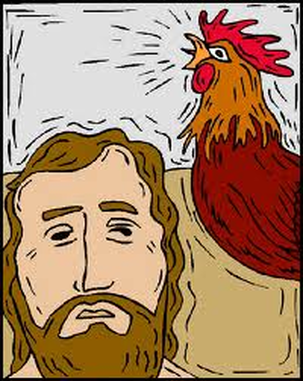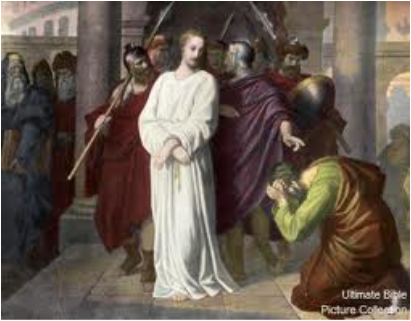While reading Luke, I came across quite a few people who stood out. Peter is one person in particular that stood out and this was not only because he was the chief of Jesus’ disciples. Peter caught my attention especially and kept it after Jesus’ arrest when he went forward to deny him. Nevertheless, at the Last Supper Jesus predicted Peter denying him not just one time, not just two times, but three times. “This very night, before the rooster crows you will disown me three times” (Luke 22:34). When the rooster crowed Peter recalled the prediction of Jesus and let out a bitter cry of repentance. This became known as the Repentance of Peter. The story of Peter’s three fold denial of Jesus is so powerful that it is found in all four Gospels. I immediately began to ask myself questions like “Why did Peter deny Jesus?” “Was He ashamed of Jesus?” “Was he fearful of losing his own life by not denying Jesus?” These were all questions I felt like I should be asking to gain an understanding of why exactly Peter denied Jesus.
Before I proceed to examine why the Apostle Peter denied Jesus three times, I find it just as important to go back and figure out what happened prior to him denying Jesus on these accounts. Subsequent the Last Supper, Jesus was brought before the Jewish Sanhedrin which was a panel of religious groups who ran Israel and despised Jesus. By the end of the series of questions, they beat and insulted Jesus badly. Peter stood there to witness Jesus undergo the harsh questions, demoralizing insults, and brutal beatings from the men. Therefore, at this point Peter may have developed a certain level of fear within himself. From witnessing this, Peter was probably frightened for the life of himself and Jesus. One could understand why Peter would be fearful.
The first denial occurred following the arrest of Jesus where the soldiers then led him to a courtyard where Peter initially remained outside until he was able to enter. As Peter sat, the Gospel told of how a girl came over and asked Peter if he knew that man (referring to Jesus) and he denied knowing anything of him. The second account of denial occurred as Peter was walking to the gateway from the courtyard and the girl followed him and spoke out to a crowd of bystanders saying that Peter was with Jesus of Nazareth. On this account, Peter denied with an oath saying that he did not know Jesus. The third and final account, one of the slaves of the priest (being related to the one who ear Peter cut off) exclaimed she remember seeing Peter in the garden and called him Galilean. By this time Peter had cursed and swore not to know Jesus and a rooster began to crow.
Peter’s weakness played a key role in his denying of Jesus. Following the last supper, Jesus told Simon that he has prayed for him and that his faith may not fail him but because his spirit was not strong enough. Peter had a spirit of weakness within him and he was immediately devoured by the enemy because he was not prayed up and he doubted his own weakness. Peter was denied Jesus because he was not a good listener as well because if he had listened he would have recalled Jesus saying “Simon, Satan has asked to sift all of you as wheat.” Just as a weak man, Peter was defeated. Fear was another element that gripped Peter and played a major role in his denying Jesus multiple times. Mark Roberts states, “ Peter was afraid, understandably so. All that he had hoped seemed to be crumbling before him. The one he believed to be the Messiah, the Savior of Israel, was now arrested.” Jesus’ death seemed certain, and with his death the end of Peter’s reason for living. From the minute Peter saw Jesus being beat and insulted, he developed a sense of fear for his own life. For Peter feared he was not strong enough to face the persecution that the world had in store. Austin Cline states, “It is worth remembering that according to Mark, Peter was the first disciple called to Jesus’ side (1:16-20) and the first who confessed that Jesus was the Messiah (8:29). Nevertheless, his denials of Jesus may be the most vehement of all. This is the last we see of Peter in Mark’s gospel and it’s unclear whether Peter’s weeping is a sign of repentance, contrition, or prayer.” Peter essentially let his weakness and fears of losing his own life lead him to denying Jesus.


 RSS Feed
RSS Feed